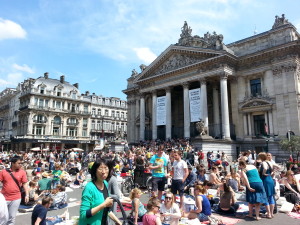(or Happy UN Day, 24 October 2012)
The United Nations is celebrating its 67th birthday on 24 October 2012. A lot can be said about its many achievements, but also its numerous shortcomings. Without going into the historical details, I try in this piece to identify the UN’s strengths and weaknesses, as they relate to today’s world. I conclude by making seven suggestions for improvement, namely:
- Less talk and more focus on problem-solving;
- More involvement of regional organizations to rationalize the number of negotiating parties;
- Organic connection to limited-membership intergovernmental bodies that matter, notably the G20;
- Better use of the broad expertise available in the entire UN system;
- Bringing together all relevant stakeholders into joint projects focusing on implementation;
- “Quantitative easing” at a global scale, to kick start economic activity in developing countries, and fulfill various financing-for-development promises;
- Bringing the UN closer to the average individual and making them feel that it is their United Nations.
Those familiar with the UN’s good deeds may want to skip the first long section on strengths and go to the second, more critical part, or go straight to the final section, where I analyze the seven suggestions for improvement.
Strengths
The UN and the system of multilateral agencies that revolve around it[i] have some clear strengths, namely:
+ Near-universal membership of countries, especially in the UN General Assembly, and therefore moral authority and legitimacy in representing “the World”. This is particularly exemplified in the “global village” gathering of national leaders each September in New York, but also on special occasions for global challenges like food security (Rome, 2009), climate change (Copenhagen, 2009) and sustainable development (Rio de Janeiro, 2012).
+ Norm and standard setting in areas related to human rights, including women’s and children’s rights, workers rights, refugee rights, indigenous peoples’ rights, disabled people’s rights, etc., all of which serve as a guide for action, and to judge the actions of, governments around the world.
+ Creation or guarantee of principles that regulate behaviour among states, such as the peaceful resolution of disputes, the “common but differentiated responsibilities” for addressing climate change and other global challenges, the interconnection of the three dimensions of sustainable development (economic, social, environmental), etc.
+ Efforts at conflict prevention and peace-making by the UN Secretary-General and his various special envoys may have varying degrees of success but are often the only ones accepted by all parties in a conflict. And when the peaceful settlement of disputes fails, there is also peacekeeping and peace enforcement, under an increasingly unrepresentative but still legally empowered and potentially effective Security Council.
+ Concrete goals and mechanisms for advancing the wellbeing of humanity, especially its less privileged parts, notably through the Millennium Development Goals (MDGs).
+ Technical standards for safe operation and cooperation in various areas of human activity, from safe travel by air and sea, to telecommunications, postal services, health, keeping the environment clean, safely operating nuclear plants, recognizing the world’s cultural heritage, etc. through organizations like ICAO, IMO, ITU, UPU, WHO, UNEP, IAEA, UNESCO, etc.
+ Warning systems based on scientific evidence about imminent threats, from diseases and environmental degradation to all-encompassing climate change, food crises and even financial crises, through agencies like WHO, UNEP, IPCC, FAO, UN-DESA, UNCTAD, IMF, World Bank,[ii] etc.
+ Humanitarian assistance, from feeding, vaccinating and schooling poor children through UNICEF, to providing for the victims of drought and hunger through WFP, to taking care of the needs of refugees through UNHCR, etc.
+ Development assistance, including expert knowledge, capacity building and funding, through UNDP, the World Bank, IFAD, GEF, etc.
Weaknesses
Inevitably, the UN also has some quite clear weaknesses, which have to be acknowledged and dealt with:
– Too much talk and too little action often characterize the UN, not least the General Assembly, where the democratic one-country-one-vote principle looks increasingly irrelevant compared to the powerful influences that shape the real world outside, from state and non-state actors. By the time agreements are reached, often by consensus, among 193 countries, they contain very little that can be actually applied in their convoluted prose.
– Country representation mainly by diplomats, in the UN General Assembly and even in the more “specialized” Economic and Social Council (ECOSOC), makes tackling global challenges with strong technical elements like climate change, food insecurity or unemployment a virtually impossible task. Instead of problem solving, what all too often happens is negotiating of lowest-common-denominator political texts.
– A ritualistic insistence on debates of the past, between North and South, East and West, and related diplomatic point-scoring, with minimal or no connection to today’s world realities and to solving the actual problems facing humanity.
– Fragmentation of efforts and lack of coordination between the political centre in New York and the more specialized technical agencies of the UN system that cover from economics and finance to health, education, telecommunications, etc. In addition to bureaucratic infighting, this reflects a lack of coherent guidance by national governments, which are represented in the UN specialized agencies by different line ministries that often take a narrow sectoral approach.
– No effective connection to limited participation bodies, like the G20, that powerful countries create to deal with key issues outside the egalitarian “’one country one vote” system of the UN General Assembly.
– Reliance on ad hoc arrangements of questionable accountability and effectiveness for engaging powerful non-state actors, like the globalized private sector and civil society, which can nowadays mobilize a lot more resources than small or medium countries can.
– For UN Headquarters, too much reliance on and embracing by actors based in New York and the US Northeast, often non-governmental actors, including media, foundations, think tanks and academic institutions, which attempt to monopolize the attention of UN senior staff and diplomats and become “the world” in their eyes, disconnecting them from the realities faced by the actual 7-billion-people-strong worldwide constituency.
Suggestions for improvement
From this author’s experience with the UN, in theory but also very much in practice, the following suggestions if implemented could make a positive difference for the UN and the world:
1. Less talk and more focus on problem-solving, bringing into the discussion experts, from governments and other stakeholders, who actually know in depth the issues and have to deal with them on a daily basis in the real world. Thus each problem-solving debate/conference could be preceded by a mapping of the relevant actors globally, with invitations sent to high-level representatives of such actors to participate. It could all be topped up with an intergovernmental debate to keep official delegates and leaders happy, but once the expert voices have been heard. Timid steps in this direction have been made by the General Assembly, its Main Committees and ECOSOC, but they are completely informal, disconnected from any decision-making and the selection of invited experts is often haphazard. Having permanently stationed at the country missions to the UN, along with the diplomats, experts in the key areas of UN activity, including economic, social and environmental, from the relevant country ministries, would help a lot too.
2. More involvement of regional organizations to rationalize the number of negotiating parties and reach decisions faster and of a more applicable nature. Arrangements in this direction could be introduced without a (very difficult to achieve) amendment of the UN Charter, by agreeing that regional organizations (real ones, like the AU, ASEAN, CARICOM, EU, League of Arab States, Mercosur – not just geographical groupings) and key individual countries would get together to discuss draft resolutions before formal submission to the General Assembly and other intergovernmental bodies, ideally including the Security Council too. How each organization would be represented, by the country that chairs it during that period or through a supranational body as in the case of the European Union, it would be up to the countries covered by the respective organization to decide. This way the one-country-one-vote system would be maintained for final approval, while allowing initial consultations and action planning in smaller groups. Of course, a lot would depend on the degree of integration and effectiveness of the regions, which is far from homogeneous, but would probably have the positive side effect of expediting regional integration.
3. Organic connection to limited-membership intergovernmental bodies that matter, notably the G20. In fact, actual decision-making or at least decision-preparation in the UN context on the basis of regional representation and involving only major countries individually would obviate the need for the establishment of ad hoc bodies outside the UN. While such bodies may be useful for crisis management, eventually they suffer from the lack of legitimacy or succumb to broader participation rituals and proceduralism over time. Interesting to note in this respect the current General Assembly President’s stated intention to connect the UN and the G20, or the “G193” and G20. It remains to be seen how he will attempt to do that and how successful he will be where others failed.
4. Better use of the broad expertise available in the entire UN system, bringing together into a coherent whole the now scattered organizations, and providing central leadership, vision and direction. This would mean upgrading and making more substantive the existing system-wide mechanism, the UN System Chief Executives Board for Coordination (CEB), which is chaired by the UN Secretary-General and attended by the executive heads of UN specialized agencies, funds and programmes. The CEB in its current state, with its two meetings per year and with minimal high-level attention in-between, cannot realize its potential and is led adrift by petty competition between agencies for predominance and access to limited resources. Stronger leadership by the UN Secretary-General and his Deputy, coupled with appropriately coordinated guidance by UN member states, who are represented in the assemblies and governing bodies of each UN system entity but are often incoherent themselves, would make the UN system much better value for money for the global taxpayer.
5. Bringing together all relevant stakeholders into joint projects focusing on implementation. International public-private partnerships increasingly promoted by the UN Secretary-General are moving in this broad direction, covering issues of global concern from health to energy and education. However, a lot more needs to be done to ensure accountability, from the selection of the participants to the planning phases, to the actual investment of pledged resources and the achievement of the stated results. Before that happens, such partnerships can be variously seen as social or image-making opportunities for those participating (“bluewashing”), or products of political expediency, or as a way of bypassing UN member state control over substance, process and budgets. It will be interesting to see how the participation of stakeholders other than member states will be organized in the context of the high-level political forum mandated by the UN Conference on Sustainable Development (Rio+20) in Rio de Janeiro last June and due to meet for the first time in September 2013. Another project mandated by Rio+20, the development of Sustainable Development Goals (SDGs), can offer the context for broad mobilization and partnerships, especially as regards sustainable development implementation, in the post-MDG/post-2015 period.
6. “Quantitative easing” at a global scale, to kick start economic activity in developing countries, and fulfill various financing-for-development promises. Developed countries have been adding liquidity to their systems to help themselves out of the financial crisis by basically printing new money through their central banks. Why not have the world’s “central bank”, the IMF, issue or allocate Special Drawing Rights, which have an exchange rate equivalent to all major currencies, to be used for infrastructure projects in developing countries, especially least developed ones, to give their citizens a chance to get access to electricity, mobile telephony, drinking water, the Internet. SDR allocations for such use can be of the magnitude of the annual Official Development Assistance (ODA), which amounted to about US$129 billion from OECD DAC countries in 2010. ODA commitments are now faltering due to developed country problems, but the use of SDRs should not be instead but should supplement them. Such new liquidity would not destabilize the global financial system, as it is much lower than the new money produced by developed countries, and would in any case partly at least return to developed and emerging economies, from where the hardware, software and know-how will have to come from, providing an additional stimulus for their economies. Such SDRs be issued in annual installments for a certain period, say over 5 years to start with, and can be counted as innovative financing also towards the annual US$100 billion by 2020 agreed at the UNFCCC COPs in Copenhagen and Cancun for climate change action. Finally, some of this money could be used for large scale microfinancing projects enabling developing country smallholders and entrepreneurs, especially women, to start or expand agricultural and other small businesses, which can create a growth dynamic in their respective economies. A suggestion to use SDRs to mobilize climate change financing was put forward in recent years by IMF staff but was not pursued further; it may be time to revisit it. Of course, honest accounting, good governance, strict guarantees against corruption, transparency and accountability should be key parts of any such project.
7. Bringing the UN closer to the average individual and making them feel that it is their United Nations, not an external force, even a good one. Beyond political declarations and even money, it is through a broadly shared global conscience that attitudes can change and actions can be generated at such magnitude that will have a positive impact on human societies and the planet. Promising salvation by a UN as an outside force, or making the UN the scapegoat for the lack of leadership and effectiveness of national governments, as is often the case, will not solve any real problem. The UN needs to work a lot more on its public image, on informing the global public about its real nature and capabilities. This requires a lot of honest and eloquent work out there, by headquarters and country teams and other offices – as well as civil society organizations, academics, religious leaders and others who realize the importance of the UN – for the hearts and minds of people.
So there is a lot that needs to be done, and the UN has to run faster to keep up with developments in the world. But that can wait for one more day, and let this 24 October be dedicated to rejoicing in what the UN has already achieved. Cheers to those who have been in the centre of it all, the UN staff, as well as diplomats and experts from all around the world, who work in New York, Geneva, Bangkok, Santiago, Nairobi, Vienna and so many other offices and missions around the world day in and day out. Congratulations, praise be to you – and sleeves up again as soon as the UN’s birthday party is over!
Georgios Kostakos
Ixelles, 24 October 2012
[i] For the membership of the UN system and the full names of the various organizations see: http://www.un.org/en/aboutun/structure/index.shtml
[ii] The International Monetary Fund (IMF) and the World Bank Group are also parts of the UN system of agencies, even if they are often mentioned as rivals or alternatives to the UN, especially by finance- and economy-focused critics.



